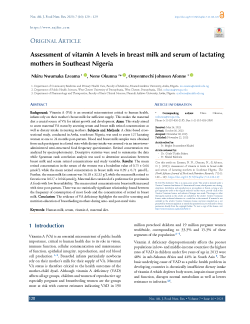Assessment of vitamin A levels in breast milk and serum of lactating mothers in Southeast Nigeria
Abstract
Background: Vitamin A (VA) is an essential micronutrient critical to human health, infants rely on their mother’s breast milk for sufficient supply. This makes the maternal diet a crucial source of VA for infant growth and development. Aims: This study aimed to assess maternal VA status by assessing serum and breast milk retinol concentrations as well as dietary intake in nursing mothers. Subjects and Methods: A clinic-based cross-sectional study, conducted in Awka, south-east Nigeria, was used to assess 127 lactating women at one to 24 months post-partum. Blood and breast milk samples were obtained from each participant in a fasted state while dietary intake was assessed via an interviewer-administered semi-structured food frequency questionnaire. Retinol concentration was analyzed by spectrophotometry. Descriptive statistics were used to summarize the data while Spearman rank correlation analysis was used to determine associations between breast milk and serum retinol concentrations and study variables. Results: The mean retinol concentration in the serum of the women was a borderline value of 0.75 ± 0.64 µmol/L while the mean retinol concentration in breast milk was 0.99 ± 0.71 µmol/L. Further, the mean milk fat content was 56.18 ± 32.32 g/L while the mean milk retinol to fat ratio was 0.027 ± 0.044 µmol/g. Maternal diet consisted of a preference for provitamin A foods with low bioavailability. The mean retinol concentration in breast milk increased with time post-partum. There was no statistically significant relationship found between the frequency of consumption of most foods and the concentration of retinol in breast milk. Conclusion: The evidence of VA deficiency highlights the need for screening and nutrition education of breastfeeding mothers during ante- and post-natal visits.
Keywords: Human milk, Serum, Vitamin A, Maternal Diet.
Full text article
Authors
Copyright (c) 2023 Nkiru Ezeama, Nene Okunna, Onyenmenchi Johnson Afonne

This work is licensed under a Creative Commons Attribution 4.0 International License.
-
Attribution — You must give appropriate credit, provide a link to the license, and indicate if changes were made. You may do so in any reasonable manner, but not in any way that suggests the licensor endorses you or your use.
-
No additional restrictions — You may not apply legal terms or technological measures that legally restrict others from doing anything the license permits.





